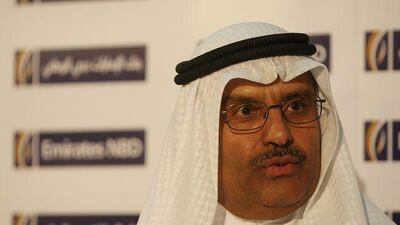Dubai hopes to give its mutual funds business a boost after striking a co-operation deal with Luxembourg that could funnel more business to the emirate's financial services sector. The financial centres of Dubai and Luxembourg yesterday agreed to work together in the areas of funds, wealth management and Sharia-compliant products. It comes as the Dubai International Financial Centre (DIFC) prepares to cut registration fees in a bit to attract more tenants.
The accord, signed by the DIFC and Luxembourg for Finance, the agency that promotes the Duchy's financial sector, is part of the DIFC's strategy to grow by facilitating financial transactions between major financial hubs in the East and West. "International co-operation is a key focus area for the DIFC going forward," said Ahmed Humaid al Tayer, the DIFC governor. "By working with other leading financial centres such as Luxembourg, DIFC brings business opportunities and an expanding scope of financial products and services."
In November, a DIFC delegation visited Mumbai with a similar aim to widen its physical and intellectual presence. The DIFC signed a similar co-operation agreement with Hong Kong in 2007. "We will remain a major exporter of wealth for the foreseeable future. We are constantly looking for ways to build relationships with governments and institutions to export some of our own banks, financial institutions and products [originated here] into Europe, the US and Asia," said Nasser Saidi, the DIFC's chief economist.
Islamic finance is one area of expertise the DIFC is keen to export. For example, the International Finance Corporation, the private-sector finance arm of the World Bank recently issued a US$100 million (Dh367.3m) sukuk on NASDAQ Dubai. Such paper can then be resold into local European and other markets. In recent years, Luxembourg has established itself as a major hub for Shariah-compliant investment funds. It has 31 Islamic funds and lists several sukuk on its stock exchange.
Luxembourg, which hosts 152 banks, is the largest investment fund centre after the US and the sixth-largest financial centre in the world. "It is a tough call ? to develop a mutual funds industry that originates here," said Mr Saidi. "Such co-operations can help." He said the local fund industry should profit from international investors seeking to diversify their investments and getting a larger exposure to emerging markets, he said.
"Over the next decade more and more investors will go into emerging markets," said Mr Saidi. So far, the DIFC has lagged in setting up a thriving funds industry, particularly when compared to other regional centres such as Bahrain. However, the Dubai Financial Services Authority, its regulator, has pledged to review its fees, which are widely perceived as too high, and to streamline its process. "The fees will be substantially reduced," said Chirag Shah, the DIFC's executive director for strategy. He said he hoped this would happen by this summer.
Luxembourg, wants to attract more of the region's wealth coming into Europe. "People in this region look to invest their wealth. Traditionally, much of that has gone to Switzerland and London, but recently we are seeing an increase of capital coming from the Middle East [into Luxembourg]," said Luc Frieden, the Luxembourg finance minister. The financial industry contributes 40 per cent of Luxembourg's economic activity and employs one in three people.
"Our international investment funds have a wide know-how they are looking to invest all over the world," he added. So far, the DIFC offers about a dozen Luxembourg-based funds, while investors based in Bahrain can chose from about 500 such funds. @Email:uharnischfeger@thenational.ae

